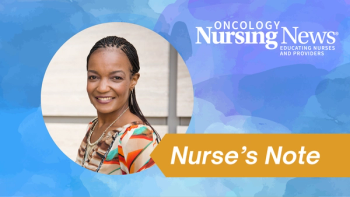
- May 2019
- Volume 13
- Issue 4
Just a Call Away? The Dilemma of Providing Patients With Personal Contact Information
How to balance providing compassionate cancer care and maintaining professional boundaries.
Each day, oncology nurses show up to care for patients facing some of their most difficult times. Compassion and empathy are required skills that allow nurses to connect with their patients. Over time, personal relationships develop that include sadness, fear, and celebration. The ability to connect and be present both professionally and emotionally requires skills built upon experience and deeply rooted personal values. Maintaining professional and emotional boundaries is not always easy, however, and all nurses are at risk for boundary crossing and violations.
A therapeutic relationship is the gold standard of all nurse—patient relationships. It is professional, patient centered, and built on trust. According to the National Council of State Boards of Nursing, there are no definite lines of separation between underinvolvement and overinvolvement.1 It is the nurse’s responsibility to understand an imbalance of power can lead to boundary violations. Nurses can protect themselves by doing the following steps:
• Maintaining professional boundaries
• Ensuring the relationship is always therapeutic
• Setting up measures to safeguard against boundary crossing, especially if there is an isolated example
• Understanding that boundaries can be compromised by patient needs, the nature of therapy, influences from the community, and the care setting
However, as nurses often find, real life does not always fit neatly into a handbook for maintaining professional boundaries. There is an emotional cost that comes with caring for our patients. At times, it can be difficult to separate a patient’s suffering from our own vulnerability. Sometimes when our emotions cloud our better judgment, we find ourselves letting our guard down and inadvertently crossing a professional or emotional boundary.
One example may be providing your personal cell phone number to a patient, for after-hours support, even though hospital policies state this is not appropriate. During moments like these, nurses need to step back and spend time understanding what is driving them to cross a boundary that could affect their career. Offering your cell phone number might seem to be in the best interest of the patient at the time, but the consequences can reverberate. Among these is confusion for the patient and caregiver. Consider these questions:
• In the event of a medical emergency, who does the patient call?
• Does your liability insurance cover you for providing patient care after hours?
• How do you document after-hours conversations with patients?
• How do you respond to calls that you may not receive due to limited cell phone coverage?
There is also the risk of your patient developing an emotional dependence that will be difficult to manage as your relationship escalates to a level that far exceeds what is considered a normal and professional relationship.
Maintaining healthy boundaries help nurses guard their hearts from being consumed with pain and suffering. It also helps ensure you will have room for the next patient who will need your care. The following are healthy tips to help protect yourself from becoming consumed by those who are suffering.
• Protect your time away from work. Be careful about picking up overtime.
• Recognize it’s okay to feel sad.
• Spend time with people who build you up and who you truly care about.
• Make your passion a priority. Spend time doing what makes you feel alive and connected outside of the work environment.
• Let go of things that you can’t control.
• Be kind to yourself.
• Remember it’s OK to say no.
• Practice mindful meditation.
Most importantly, always take time to remember why you chose oncology nursing for your career. This is what will ground you during your most vulnerable and difficult days.
Reference
- National Council of State Boards of Nursing. A Nurses Guide to Professional Boundaries. Chicago, IL: NCSBN; 2018.
Articles in this issue
over 6 years ago
Oncology Nurses: Have You Read a Good Book Lately?over 6 years ago
Caregivers' Mental Health Varies by Genderover 6 years ago
Resilience Is the Antidote to Nursing TraumaNewsletter
Knowledge is power. Don’t miss the most recent breakthroughs in cancer care.




